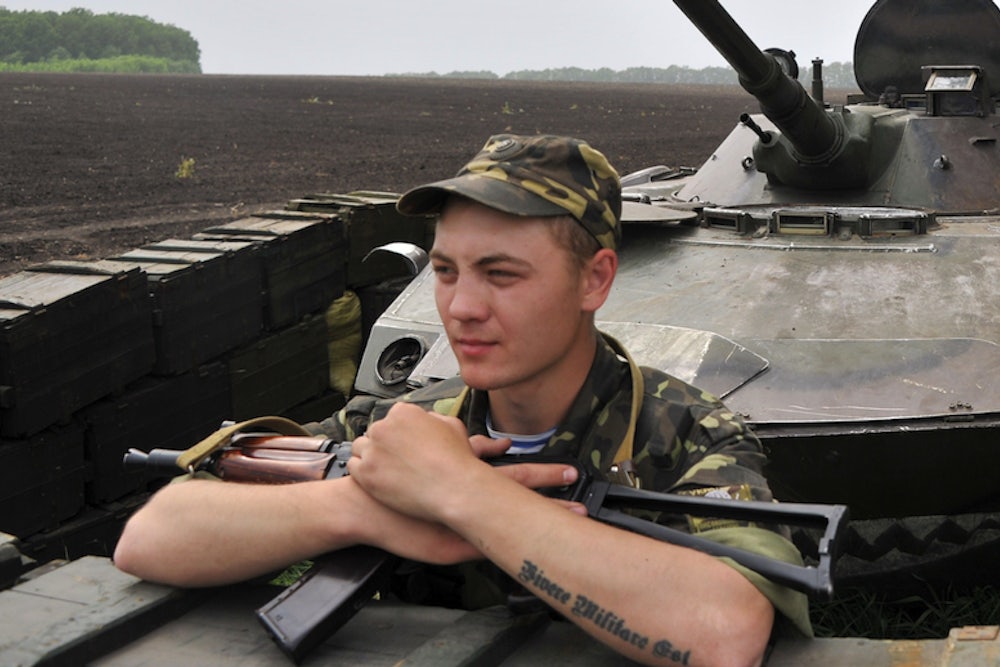Before hopping on his flight to Shanghai Monday morning, Russian President Vladimir Putin convened his security council to talk about the situation in Ukraine. Then, for the third time, the Kremlin said that Russian troops would be pulling away from the Ukrainian border. We have no reason to believe Putin this time, but on the off chance that he actually means what he says, he might be calling his own bluff on the possibility of a Russian invasion of Ukraine and giving the beleaguered country some breathing room ahead of the presidential election on Sunday.
The first two times Putin announced a withdrawal from the Ukrainian border, nothing happened; tens of thousands of Russian troops remained stationed ominously close to the border and showed no signs of moving, as U.S. satellite imagery confirmed. So far, no meaningful troop movements away from the border have been observed, but defense experts told The Guardian that it will take at least 24 hours for the order to be implemented.
Meanwhile, Russian media is already circulating footage of troops packing up their tents and readying tanks for withdrawal. But as Raymond Finch, a Eurasian military analyst at the Foreign Military Studies Office, cautioned, “you literally cannot believe what you see. That might be from six months ago.” Indeed, just this morning Radio Free Europe’s Carl Schreck reported that Russian state television had used footage from an 18-month-old operation in the North Caucasus in a segment on fighting in east Ukraine.
Regardless, the Kremlin's statement is a clear effort to distance itself from Ukraine’s pro-Russian separatist governments, which remain locked in deadly confrontations with state anti-terrorist forces. “What matters is the evidence that Putin is distancing himself from the bullies inside. That matters more than the actual physical deployments of troops on the border,” said Jacob Kipp, a security expert at the Jamestown Foundation.
Moreover, if Russian troops do retreat to their “usual garrisons,” plenty of Russian forces will still be well within striking distance of Ukraine. There are multiple Russian bases along the Ukrainian border, so for troops to move back to their permanent stations might not mean all that much as far as de-escalation goes. “It seems that [Putin’s] agents are having more problems [in eastern Ukraine] than they bargained for, and he is now perhaps looking to minimize his overexposure,” said Stephen Blank, senior fellow at the American Foreign Policy Council. “But the fact of the matter is they could withdraw five miles and then they could come right back.” Russian forces, Finch says, “are not that far from the Ukrainian border to begin with. For them to turn around wouldn’t be that big of a move.”
And then there’s the fact that the order to withdraw was pinned to the completion of “spring military training programmes," which are likely training exercises for new conscripts. “It’s a rotating cycle, so they’re constantly bringing in new recruits and discharging old recruits,” says Finch. “That lends credence to the fact that Putin would not use this force for invasion—sometimes these guys can’t even drive yet, and they’re going to operate an APC—that’s sort of a challenge. They learned this lesson in the Chechen War. Sending conscripts into battle just isn’t going to work.”
So while this may be one of Putin’s “judo-inspired feints,” as the New York Times has described his machinations, it’s a feint that confirms the distinct improbability of a full-fledged Russian invasion in the east. Given Ukraine’s anti-terrorist mission in the east, “the idea of a Russian march in Ukraine has decreased—it would be a very costly campaign,” says Kipp. “[Putin] wants to distance himself from the possibility of a war breaking out that he has to commit large-scale troops to in a more classical form,” says Blank. “That has never been his agenda, we should have understood that for the beginning."
